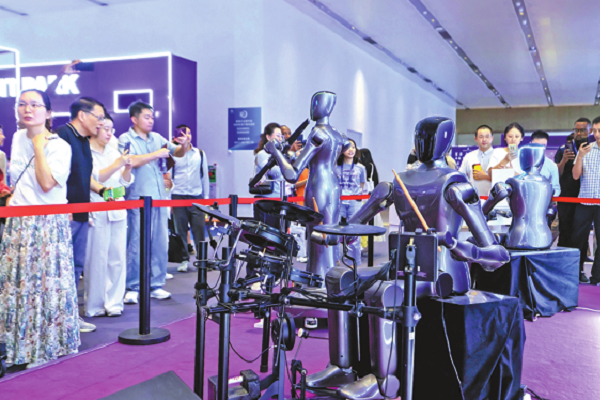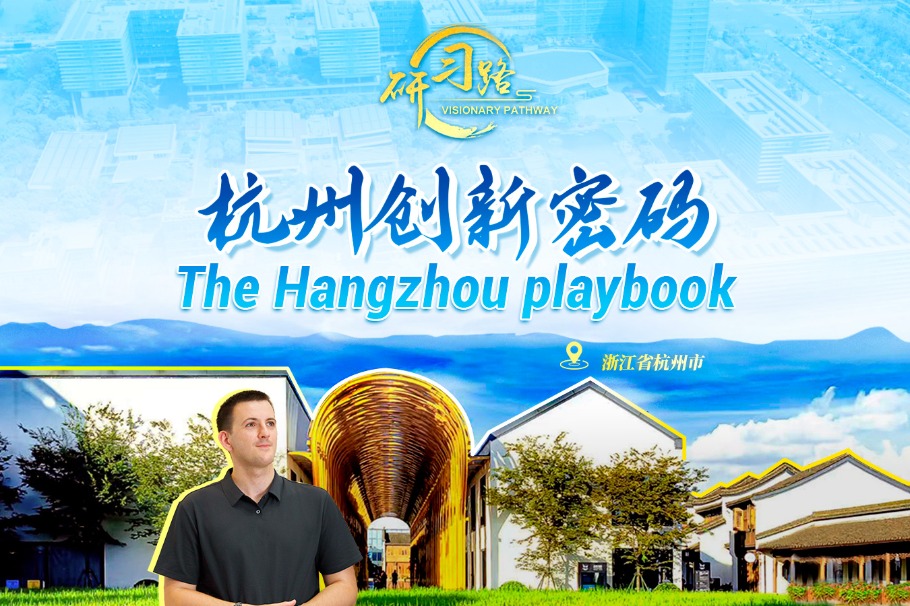Zhejiang leads in cross-border e-commerce growth

Visitors watch a humanoid robot band perform musical instruments at the fourth Global Digital Trade Expo.
As a significant engine for China's opening-up, Zhejiang province in East China has achieved remarkable results in high-level opening-up and cross-border e-commerce in recent years, according to data released at the just-ended fourth Global Digital Trade Expo in Hangzhou, Zhejiang province.
In 2024, Zhejiang's total foreign trade value reached 5.3 trillion yuan ($742.9 billion), a year-on-year increase of 7.4 percent, with an export value of 3.9 trillion yuan, maintaining the second-largest scale in the country.
The total foreign trade value of services trade and digital trade increased by 24.5 percent and 14.5 percent year-on-year respectively. Represented by regions and enterprises such as Xiaoshan district, Alibaba, and Hangzhou Haicang Technology, Zhejiang is promoting high-quality development in the cross-border e-commerce and foreign trade fields through innovative models and digital technologies.
Xiaoshan district in Hangzhou, the province's capital, is recognized as one of the top 10 strong foreign trade counties in Zhejiang province, thanks to the resources of the National Airport Economic Demonstration Zone, Xiaoshan Block of the China (Zhejiang) Pilot Free Trade Zone, and China (Hangzhou) Cross-Border E-Commerce Comprehensive Pilot Area, said officials from the Xiaoshan district commerce bureau.
By promoting multichannel integrated sales models such as independent sites and overseas marketing centers, the district has become a model for high-level opening-up, said local officials.
In 2024, the cross-border e-commerce export volume of Xiaoshan reached 23.8 billion yuan, a year-on-year increase of 57.6 percent, ranking first in the province. This district supports enterprises in exploring emerging markets involved in the Belt and Road Initiative and the Regional Comprehensive Economic Partnership agreement, providing comprehensive services such as booth subsidies and overseas warehouse support.
During the expo, Yu Qian, deputy director of the foreign trade section of the Xiaoshan commerce bureau, said that Xiaoshan district is building four global cross-border e-commerce centers, comprising the cross-border smart chain center of industrial belts, global live marketing center, overseas supply chain service center, and trade risk emergency service center. These centers foster the deep integration of cross-border e-commerce and manufacturing through flexible supply chains, virtual reality workshop livestreams, and localized marketing in Southeast Asia, creating a new model of brand globalization and transitioning from order-driven export to brand-led globalization.
Alibaba.com, the first business platform launched by Alibaba Group to aid enterprises in expanding their business abroad, has developed into an internationally renowned business-to-business digital trade platform over the past 25 years. Its users now cover more than 200 countries and regions in 16 languages, with nearly 200,000 suppliers and more than 40 million buyer users globally.
It is now integrating the latest generative artificial intelligence technology into various aspects of the foreign trade industry to help small and medium-sized enterprises complete their overseas tasks.
In November 2024, Alibaba launched Accio, the world's first B2B AI search engine, which simplifies the procurement process by supporting multiple languages and billions of products. This innovation increases the conversion rate from search to purchase and lowers business operation thresholds, thereby improving business effectiveness and quality.
On the import side, Hangzhou Haicang Technology, one of the first pilot enterprises of the China (Hangzhou) Cross-Border E-Commerce Comprehensive Pilot Zone, has been rooted in Hangzhou for 11 years. Focusing on comprehensive cross-border import services, digital supply chain, and cross-border retail solutions, it helps global brands enter the Chinese market by providing one-stop services such as cross-border logistics, customs clearance, and warehousing. Utilizing its self-developed digitalized product selection center, it connects 60 countries, 2,000 brands, and 3,000 stock keeping units globally.
Haicang Technology CEO Wang Hong said that the Hangzhou Comprehensive Bonded Zone is nationally renowned for cross-border imports, forming an innovative leading advantage. The company plans to continue deepening AI technology applications to further enhance customs clearance efficiency and product selection accuracy, promoting high-quality cross-border e-commerce development.
fanzitong@chinadaily.com.cn
-
Global experts at Tianmu Mountain feel harmony of nature, culture
September 28, 2025
-
4th Global Digital Trade Expo kicks off in Hangzhou
September 25, 2025
-
Hangzhou to welcome global experts on ecology
September 17, 2025
-
Visionary Pathway - Hangzhou Playbook
July 15, 2025



